Peer-Led Team Learning
Peer-Led Team Learning (PLTL) is an academic assistance program that utilizes peer collaborative learning study sessions. PLTL sessions are regularly scheduled, informal review sessions which allow students to work in small groups with their classmates to apply or practice similar problem sets they have learned in class, compare notes, discuss readings, develop organizational tools, and predict test items. Students learn how to integrate course content and study skills while working together. The sessions are facilitated by “PLTL leaders”, students who have previously done well in the course. Traditionally, PLTL targets high failure, high enrollment rate courses. Currently it is offered in Intro to Financial Accounting (ACCT 2301), Anatomy & Physiology (BIOL 2401), General Biology I (BIOL 1306), Chemistry for Engineers (CHEM 1309), General Chemistry 1 (CHEM 1311), General Chemistry 2 (CHEM 1312), Computer Science II (CSCI 2380), Statics (MECE 2301), Mechanics of Solids (MECE 3321), Electric Circuits (EECE 2305), College Algebra (MATH 1314), Math for Business (MATH 1324), Elementary Statistical Methods (MATH 1342), Pre-calculus (MATH 2412) and Calculus I (MATH 2413). Attendance to PLTL study sessions is mandatory. Research has shown that participant pass rates are typically higher than non-participant pass rates.
Times and locations are announced at the beginning of the semester to students enrolled in the participating courses.
Annual Program Evaluation
For a copy of the annual program evaluation for the 2021-2022 academic year click here.
Results
With an expected outcome and a history of success, the Peer-Led Team Learning (PLTL) aims to contribute to increased learning and therefore an improvement in students’ success, as measured by pass rate and retention rate, in high enrollment and high failure rate courses. The PLTL program was expanded significantly in 2022 with a total of 6,313 students enrolled in courses with PLTL in Fall 2022.
|
Fall 2022 |
|
|
New PLTL Courses |
Traditional PLTL courses |
|
|
Peer-Led Team Learning Expansion (new PLTL courses)
The graph below shows the course pass rates in Fall 2021 without the PLTL implementation compared to the Fall 2022 course pass rate with PLTL implemented. If we look at the course pass rate of those students who regularly participated in PLTL (less than 5 absences), it is evident there is more potential to increase student success in these courses. The grey bars in the graph below reveal potential for increasing pass rates to a higher extent by increasing participation and engagement of those students who are not participating as regularly (greater than 5 absences).
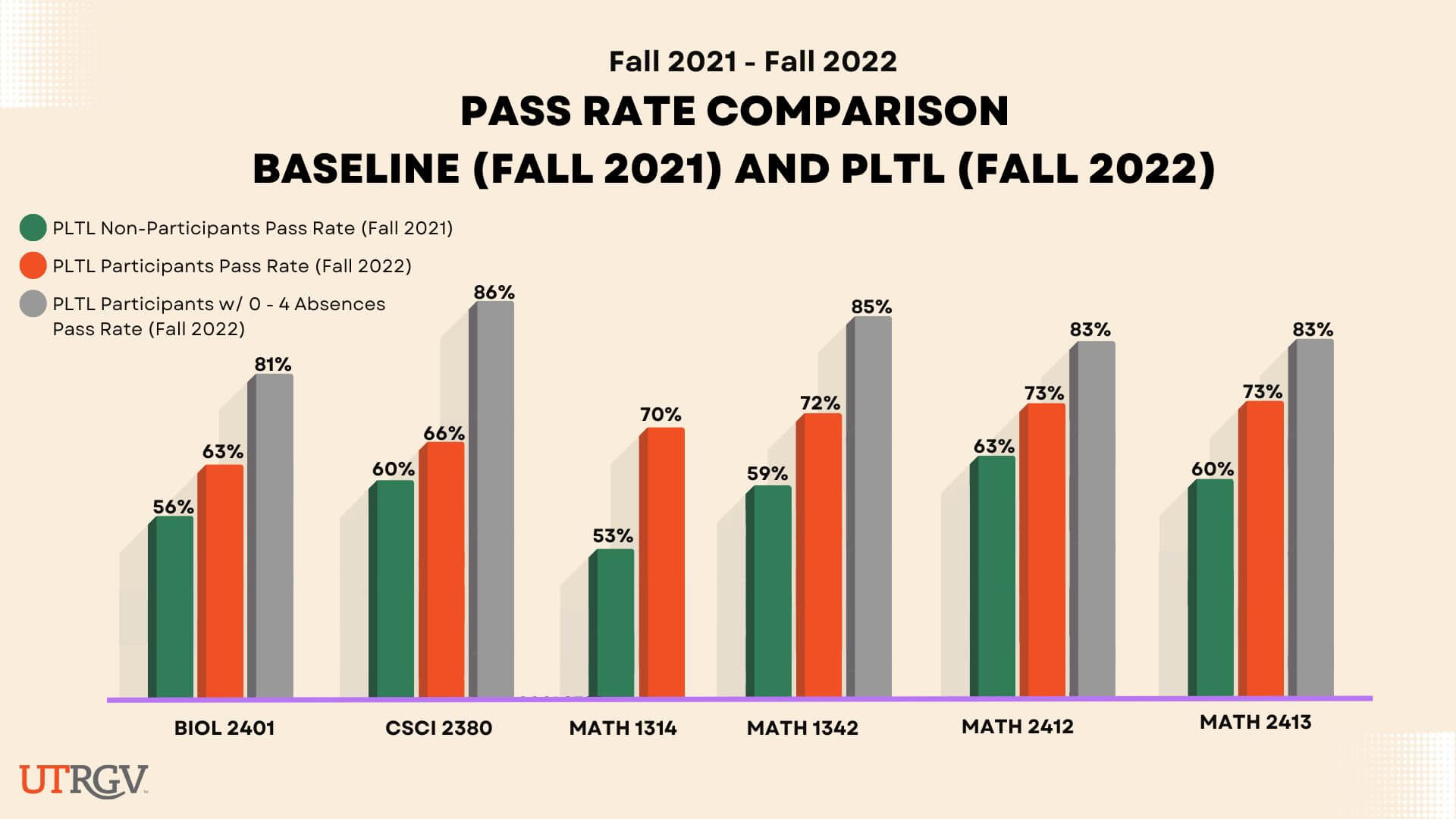
Peer-Led Team Learning in Established Courses
While we have expanded the PLTL program exponentially in the past year, there are still the four established PLTL courses that have demonstrated the consistent impact over a longer period that also implemented PLTL in Fall 2022 (The fifth traditional course, Chemistry for Engineers – CHEM 1309, was not offered with PLTL in Fall 2022 but resumed in Spring 2023). In the graph below, the green bar represents the baseline or pass rate for the last Fall before the implementation of PLTL. Therefore, the green bar for CHEM 1311, CHEM 1312, and MATH 1314 (pilot) illustrates the pass rate for those courses in Fall 2015 as PLTL implementation began in Fall 2016 for these courses. The green bar for MATH 1324 represents the pass rate in Fall 2018 as PLTL implementation began in Fall 2019. The data trends represented in the two graphs below (PLTL gains over time) are the same as with the newly expanded PLTL courses in that the pass rates for students participating in PLTL are higher than the pass rates of the same courses prior to implementation of PLTL and the more students participate, the greater the gains in terms of pass rates.
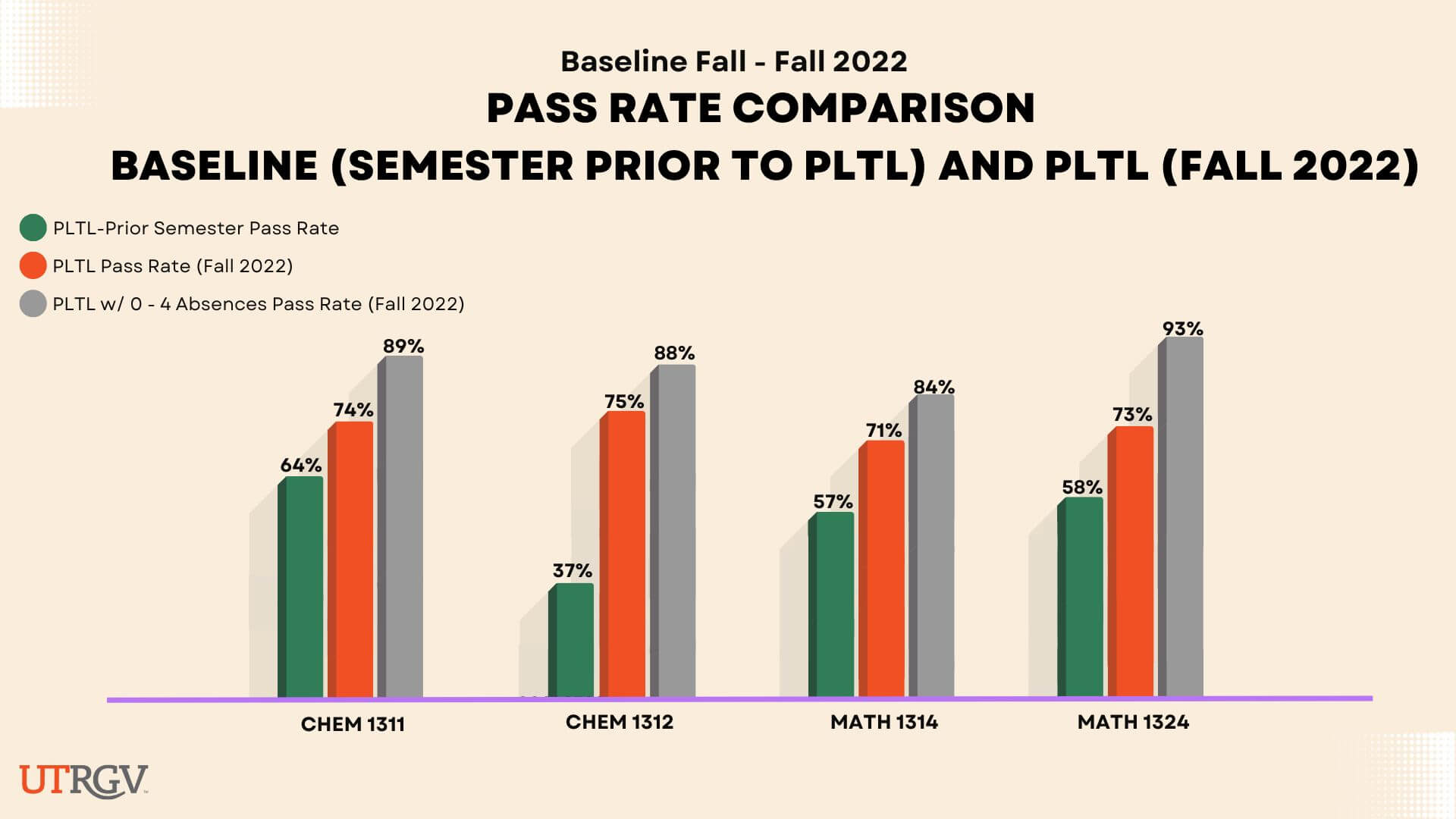
A Look at Semester-to-Semester Retention by PLTL participation
The extent of student participation in PLTL correlates with Fall to Spring retention as well. The graph below shows the overall retention (blue bars) along with the retention of students that had less than five absences (grey bars). Institutionally, we have seen trends that if we can retain 93% of students from Fall to Spring, we are more likely to have an 80% retention rate for Fall to Fall. If we set our benchmark at 93% retention for Fall to Spring in PLTL courses (as indicated by the data trend line in the graph below), then it is evident the students who participate in PLTL on a regular basis (with less than 5 absences) are more likely to be retained at that rate in nearly all PLTL courses measured.
PLTL expansion in Spring 2023 and Fall 2023
PLTL was expanded to General Biology I (BIOL 1406) and Introduction to Financial Accounting (ACCT 2301) in Spring 2023. Current discussions involve the further expansion of PLTL into Introduction to Management Accounting (ACCT 2302), and Mechanics of Solids (MECE 3321) in Fall 2023.
Accelerating Latino student success
In aggregate, from Fall 2016 through Fall 2022, PLTL has served 33,667 students with 31,205 (92.69%) of them being Latino. The number of students not participating in the program is 36,638 with 89.60% of them being Latino.
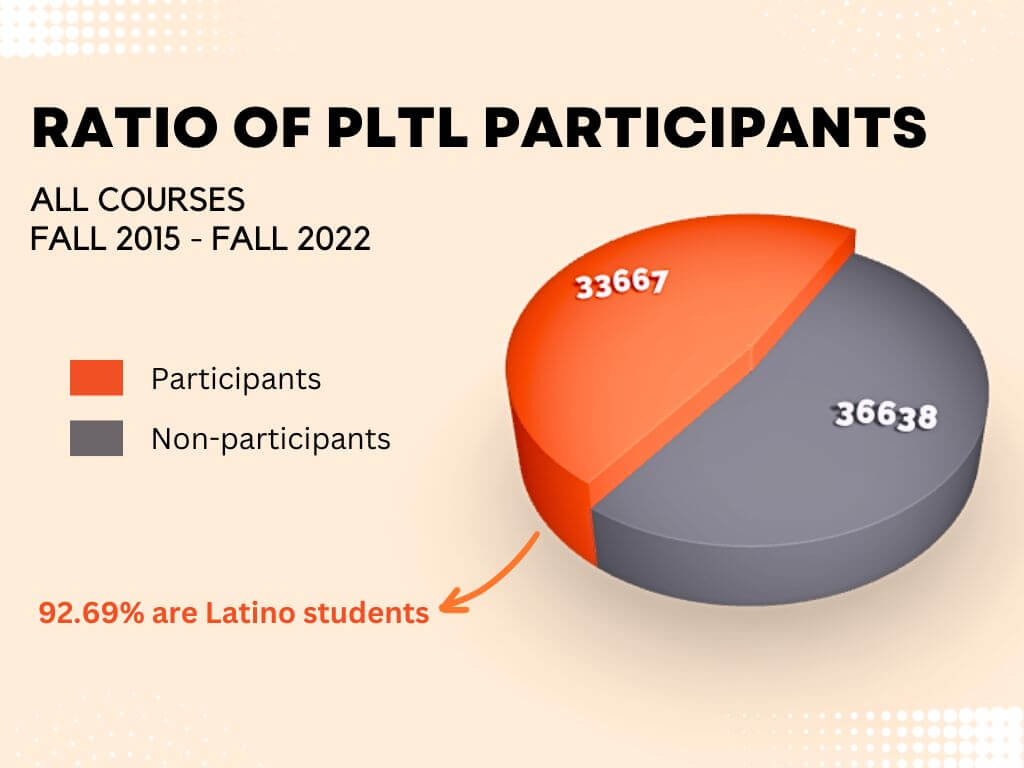
The overall pass rate of Latinos enrolled in courses with PLTL was 77.90% as compared to 57.95% for those not participating in PLTL for a percentage point difference of 19.95. The overall pass rate for non-Latinos enrolled in courses with PLTL was 79.60% compared to 71.51% for those not participating in PLTL for a percentage point difference of 8.09. In comparing the overall percentage point difference between Latinos (19.95) and non-Latinos (8.09), the program had a greater positive impact supporting Latino students as compared to non-Latino students.
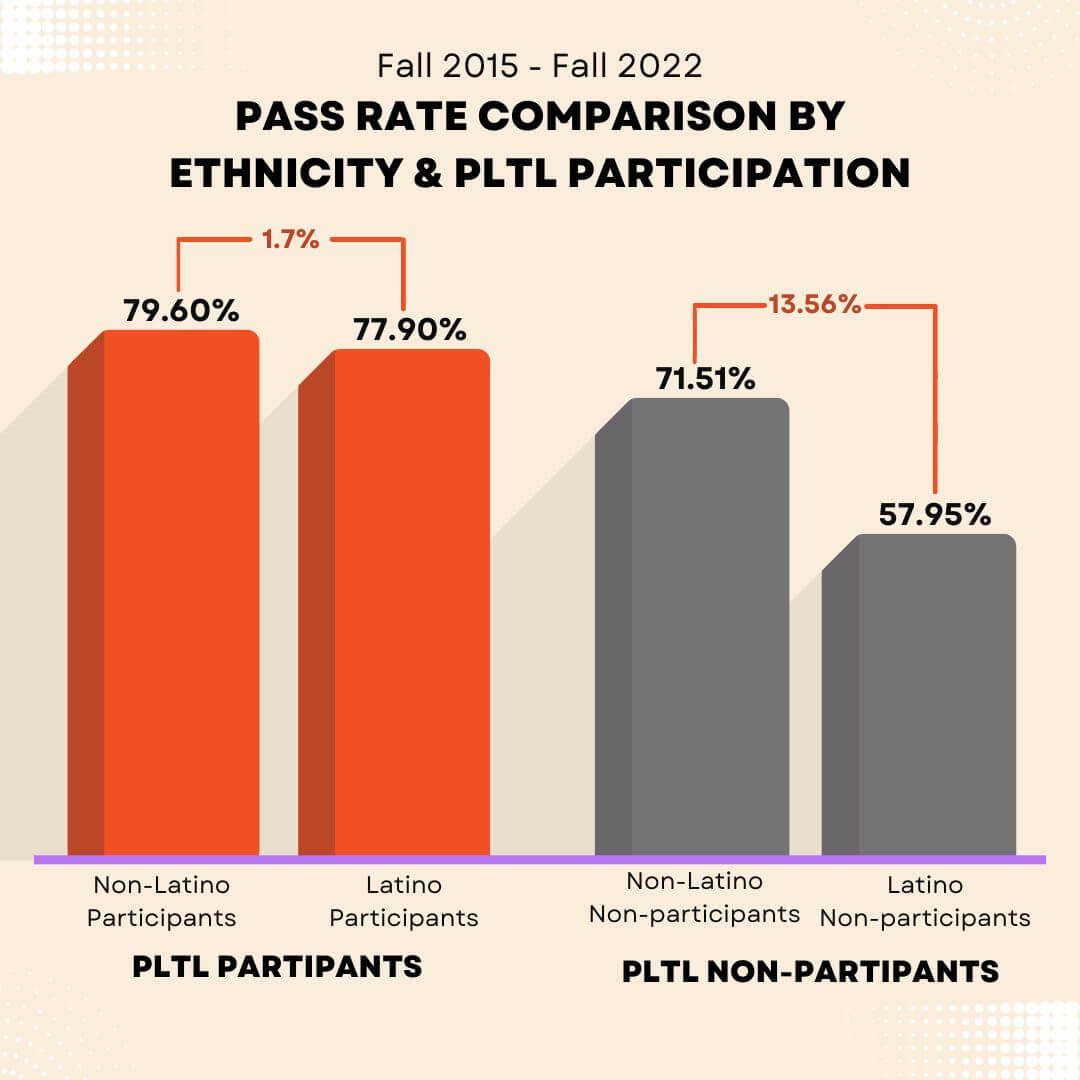
While non-Latinos still have a higher success rate in these traditionally high-failure rate courses PLTL has contributed to significantly closing the gap. When comparing the pass rates for Latino and non-Latino students not participating in the program, the results are 57.95% and 71.51% respectively for a percentage point difference of 13.56. When comparing the pass rates for Latino and non-Latino students participating in the PLTL program, the results are 77.90% and 79.60% respectively. The success rate gap, as defined by pass rate, is narrowed significantly from non-Latinos outperforming Latino students by 13.56 percentage points for non-participants to a 1.7 percentage point gap for those participating in the PLTL program. Latino students participating in PLTL are performing slightly below that of non-Latino students.
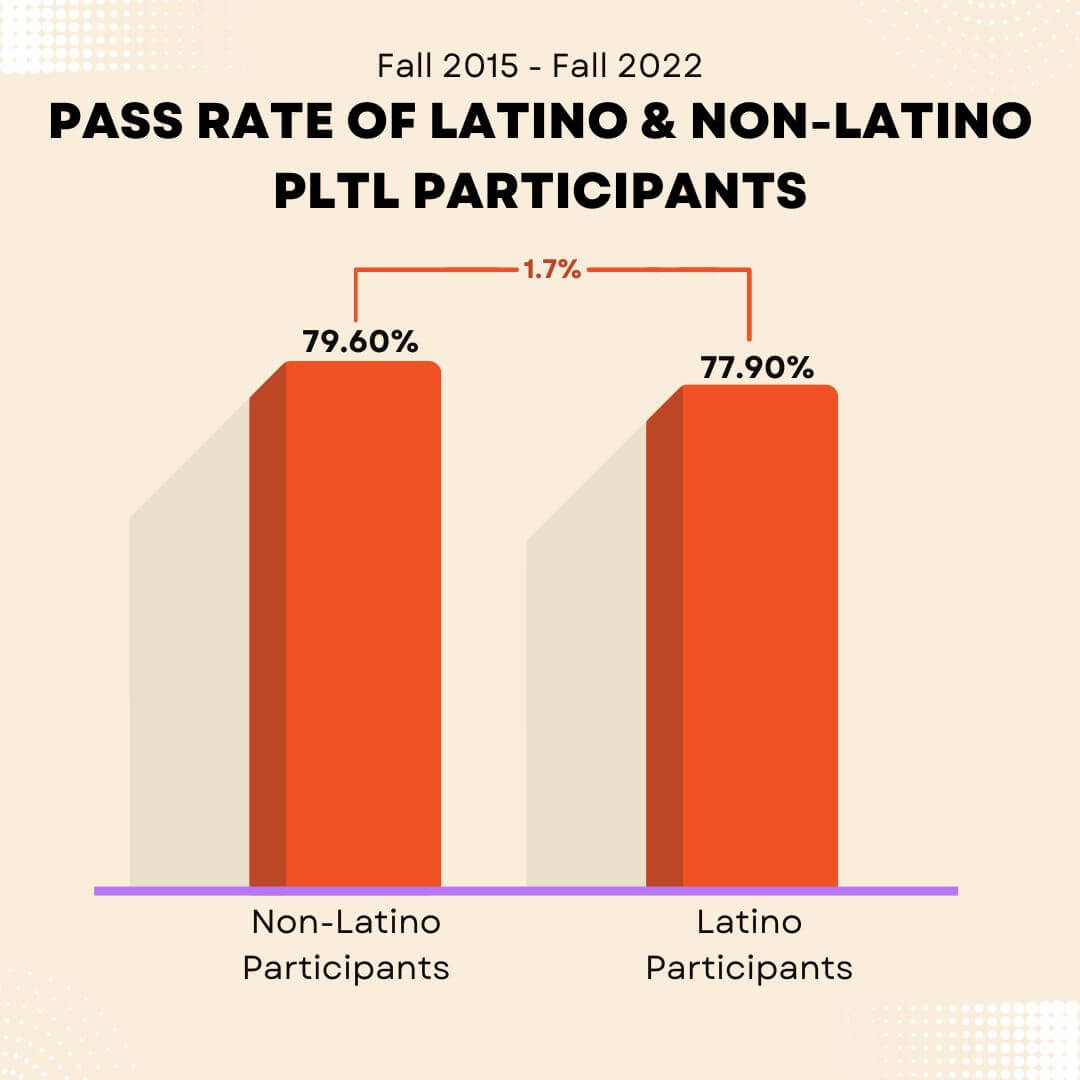
Student Opinion
Every semester a simple survey is administered to students during the PLTL sessions that allows students to document what they considered to be benefits of the program as well as to share suggestions for improvement. Trends identified in responses to the benefits include:
- Working with peers or in groups
- Extra time
- Extra practice
- Clarifies lecture
Some of the stories that students have shared with us about their experiences with the program are:
"During high school, I felt I did not learn anything due to going online during COVID-19. I did not know how to study, prepare for exams, or to interact with other people. PLTL was different from most online classes in that we would have our cameras on, and we would actually talk to people and get to see who and how they were. We were put into groups by the leaders, and it felt like the professors understood PLTL and would give material that would help understand. The leaders provided office hours for additional help aside from the professor. The problems were great practice and provided major help, especially the problems that require more attention. PLTL was a great experience that provided me with learning and guidance during a time when there was not any. "
“This class helped me a lot because we got to practice what we learned in class and get one on one help if needed. It helped me clarify any confusion and succeed in the course. It was useful and I am grateful that we had this extra help. Thank you for helping us and coming in prepared to guide us and teach us. “
“The PLTL session that I have been attending for my class has been giving me the extra practice I needed in order to fully comprehend the material covered in class. I do not have that much free time during the week, so attending the PLTL sessions is a great opportunity for me to get the assignments done and ask some questions. I always try to attend every session since missing the extra help and extra practice would only affect me in my academic experience."
"As a student, I feel like PLTL has helped me not only in the academic aspect but also as a person. PLTL allows me to practice the content learned in lecture which is helpful to better understand the material rather than just listening to the professor talk and forget about it once I leave the classroom. Additionally, it gives me the opportunity to interact with people who might be having the same issues as me or who could help me in case I get stuck in a topic. Lastly, PLTL has helped me make friends with similar interests which makes going to class a little more enjoyable."
“I can honestly say if it weren’t for this class, I would have failed pretty much all of my exams for chemistry. In the lecture, things go by too fast for me to catch onto, so I am grateful for this class because it allowed us to go over things more slowly and in groups, which made things easier to understand for me. Thank you for showing us the material and trying to help us”
Focus Groups
In addition to the survey, the Learning Center staff also surveys students about their experiences in the PLTL groups. We ask a series of questions about the effect of the group on study skills and course performance. All students respond favorably to questions about their subject-related abilities, including problem solving and the overall usefulness of the study group.
“How did you feel about having mandatory PLTL study sessions at the beginning of the semester and have your feelings changed any now that the end of the semester is here?”
Focus group responses
|
Beginning of Semester |
End of Semester |
|
Inconvenient at first, saw it as a waste of time |
it’s very helpful, really recommend it for next semester |
|
I didn’t want to be here |
now we meet extra with my study group |
|
At first nobody wanted to come |
now we come early to study together |
|
Complaints and confusion in the beginning, I didn’t want to be here |
After the test, it changes-practice helps a lot |
|
At first I thought it was a waste of time |
It clarified many of the subject topics |
|
Awkward at the beginning |
Helpful |
|
At first annoying because it’s time consuming |
Worth it |
|
Students don’t like that it’s mandatory |
It helps more than we thought |
|
didn’t like Fridays |
They like it because on Fridays, they have more time to practice Math |
Student Employee Opinion
"I joined the PLTL program in Fall 2019 for General Chemistry at UTRGV after participating in the program as a student in chemistry. The program allowed me to better understand course materials while providing networking opportunities at a professional and academic level. I’ve had the opportunity to participate in PLTL as a leader for eight semesters, giving me the gratification of helping others through teamwork, collaboration, and relationship-building. PLTL gave me the tools necessary to branch out into academic research by empowering me to seek knowledge while remaining humble and adventurous in academia. I am forever indebted as the PLTL program allowed me to grow within the field by closely working with both faculty and students. I graduated with my bachelor’s degree in Biological Sciences specializing in Chemistry in Spring 2022. I am honored to be promoted to a mentoring position as I commence graduate school. Being part of PLTL as an undergraduate gave me the opportunity to develop professionally and academically."
"I was a Peer Leader for Anatomy & Physiology I in Spring 2022. I was only in my second semester of university when I started as a Peer Leader and hadn’t found a solid group of friends yet since my first semester was completely online. The PLTL program has given me the chance to be part of a community of other like-minded students who are passionate about learning and helping others like I am. Every other leader I’ve asked for help, whether it’s directly related to PLTL, my own personal coursework, or future degree plans, has been more than happy to provide that assistance. It truly feels like a big group of friends that I know I can always turn to in a time of need, and I’m very grateful for that. The collaborative environment that we create in our classrooms during PLTL sessions lends itself well to learning and is something that students may otherwise not have access to. In high school and my first semester of university, I knew of other students who would get together into study groups, but I never felt like I could ask them if I could join the study sessions. PLTL takes that fear out of the equation and gives everyone an equal opportunity to work in groups and enjoy the benefits of doing so, like hearing other perspectives on certain topics. Seeing relationships between students develop over the course of the semester, as well as the improvement in their grades and the confidence in their knowledge of the material grow has been incredibly rewarding for me and made every bit of work I put into their learning worth it. I know that I would have benefited from having a program like PLTL in high school and my first semester of university and am proud of myself for being able to provide that to students who are in that position now. I’m looking forward to continuing to work in the program this coming fall semester!"
" I began as a quiet and shy leader, and in a year, I became a Mentor for the program. When I first joined, PLTL was only offered for College Algebra and Math for Business courses. We have now expanded to include Elementary Statistics, Pre-Calculus, and Calculus 1 as well as our prerequisites courses. To be able to grow with the program has just been an amazing opportunity.
Moving online during the pandemic was extremely hard but we made it possible. We weren’t shutting down! It required hard work from Peer Leaders, Mentors, Supervisors, and anybody involved with the program to see all our work was transitioned to an online space. We all did great work, providing the best to the students when they needed us most.
As a Peer Leader, being able to reach out to students and help them when they feel most frustrated both with academics and with life can be a gratifying experience. As a Mentor, I can guide Peer Leaders to grow into their best possible selves and allow them to help their students and their own academics as well. My beliefs of following your dreams and pursuing what you really enjoy in life regardless of societal expectations are something I like to share with the Peer Leaders I mentor, as I have experience with this myself. My fellow co-workers helped me realize that it’s okay to do something I really love even if it's not the most ordinary major. I became a Theater Major with a focus in Design Technology – my fellow peers accepted me with love and support for following my goals. I now get to do the things I love which is providing the best guidance to all new and returning Peer Leaders and Mentors, as well as pursuing a career in Theater – and believe it or not, mathematics is part of being a designer.
I wouldn’t be where I am now if it weren’t for the PLTL program and all the people I have met along the way. I am in my last year before graduation, so I hope to continue to grow my mind and meet more people during my last two semesters. It’s been a pleasure working with every single person who has come through our program. From a formerly quiet, shy Peer Leader to a currently strong, outgoing, high- spirited Mentor, I thank you from the bottom of my heart for showing me the way. One thing is for sure, PLTL will change your life for the better."
Frequently Asked Questions
What is PLTL?
PLTL (Peer-Led Team Learning) allows you to work in small groups with your classmates to apply or practice similar problem sets you have learned in class. Depending on the course you are enrolled in, you will either attend the PLTL workshops one two hour or two one hour workshops. A PLTL leader will meet with the group to provide the problem sets and help through areas that are difficult to understand.
What does PLTL do for you?
- Higher grade in the class that is traditionally difficult (high failure rate)
- Better understanding of the content, concepts, and how to apply what you learned
- Make friends
- Develop your own study groups for other courses
- Possible future employment opportunities as a PLTL leader (get an A in the class and come talk to us)
- It is free!!
Who is in the PLTL workshops?
Up to 19 of your classmates and the PLTL leader are the people that will be in the PLTL workshop with you. You will get to know them all and will work with them in small groups to solve problems, ask questions, and learn.
What courses have PLTL workshop sessions?
All sections of Intro to Financial Accounting (ACCT 2301), Anatomy & Physiology (BIOL 2401), General Biology I (BIOL 1306), Chemistry for Engineers (CHEM 1309), General Chemistry 1 (CHEM 1311), General Chemistry 2 (CHEM 1312), Computer Science II (CSCI 2328), Statics (MECE 2301), Science to Elementary Students (EDCI 3333), College Algebra (MATH 1314), Math for Business (MATH 1324), Elementary Statistical Methods (MATH 1342), Pre-calculus (MATH 2412) and Calculus I (MATH 2413) have PLTL workshop sessions.
When are PLTL workshops scheduled?
The PLTL workshop time is found next to the course in the course schedule. You cannot switch your workshop time for another so please make sure you will be available to attend at the time in the course schedule when you register.
Where are the PLTL workshops held?
The majority of the PLTL workshops are held in or near the Learning Center buildings. In Brownsville, most of the workshops are in the Music, Science and Learning Center (BMSLC). In Edinburg, most of the workshops are in the Learning Center building that is now referred to as ELCTR. Some of the workshops are held in classrooms as well. Before the first day of class, you should receive an email from the PLTL Program Coordinator or your PLTL leader that tells you where the workshop will be held. If for some reason you do not receive the email (check spam), then you can contact us. Contact information is below.
What is the PLTL attendance policy?
PLTL workshops are built into the course schedule and require mandatory participation. The PLTL workshop time is included in the course schedule so that you know not to schedule other courses during the workshop time and are aware of the time commitment upon registration so you can make job related arrangements to attend. This program is SO beneficial to your learning and your grades that coming a few times will convince you that it is a good program that you will benefit from. Give us a chance!
Who are the PLTL leaders?
Trust us, you are in good hands! The PLTL leaders are primarily undergraduate students like you, but they have already taken the course you are enrolled in and they earned an “A”. The faculty recommended them to work as PLTL leaders in their courses and the Learning Center interviewed, hired, and trained them.
Can I be a PLTL leader?
If you have taken a course that we offer PLTL workshops for, you received an “A” in the course, you have a 3.0 GPA, and you have 2 faculty recommendations (one must be from this discipline), you are more than welcome to apply for a PLTL leader position. You can find an application on this website under “Employment.”
How is Link2Success (L2S) related to PLTL?
Peer collaborative learning models with mandatory student participation have been a part of the Learning Center history since 2013. The variations and flexibility of PCL models allow institutions to design and implement according to student and program need. Prior to 2013, there was a trend of high failure rates in high enrollment core courses such as Composition I & II, U.S. History I & II, College Algebra and Contemporary Mathematics. These are first year courses that the majority of students are required to take as part of their program of study and therefore they were selected as targeted courses. The need for a first year student success initiative was discovered through a multi-year institutional self-study conducted by representatives from all areas within the institution. Once a PCL program was determined to be the intervention of choice, the design of the PCL program, referred to as Link2Success (L2S) began. Representative leaders from various institutional departments, including the Dean of College of Liberal Arts, the Executive Director of Enrollment, Dean of Students, Director of Advising, and the Director of the Learning Center were sent to participate in a jointly sponsored AAC&U and Excelencia institute with the goal of developing a program ready for implementation in Fall 2013. The model design was a combination of Structured Learning Assistance (SLA) and Supplemental Instruction (SI), borrowing the mandatory participation component of SLA and the collaborative learning environment of SI. L2S involved peer leaders sitting through the class, working closely with faculty, and offering mandatory sessions with a ratio of 1:12 of leader to student. The program was highly successful, having a significantly positive contribution for a great number of students (quantitative and qualitative data is available upon request through the Director of the Learning Center).
In 2015, the Learning Center was awarded a two year NSF grant to implement L2S at a local community college in STEM areas. The same model was implemented and therefore the name retained. The problem being addressed for the community college was lack of experienced peer leaders. With two year programs, it is difficulty to establish experienced peer leaders. The community college wished to tap into the experience of upper classman from the university and the university wished to investigate the impact of the program on a different population (community college students) and in different disciplines (STEM). The program was once again high successful, having a significantly positive contribution for a great number of students (data is available upon request through the Director of the Learning Center). In fact, the community college has sustained to program after the end of the grant.
After the completion of Fall 2015, the Dean of the College of Science (and Mathematics) requested similar support in General Chemistry I & II as well as College Algebra. A review of literature revealed an existing and well researched PCL model had been developed specifically for Chemistry and expanded to other math and science courses, referred to as Peer-Led Team Learning (PLTL). There are many variations of PLTL, but with the success experienced with the mandatory and supplemental sessions of L2S, the decision was made to offer PLTL in this format. The primary difference between L2S and PLTL is that the peer leaders do not sit through the lecture. All other aspects of the two programs are the same. PLTL was first implemented full scale in the three courses requested beginning Fall 2016. As with the results from the L2S programs implemented in other disciplines and at another institution, PLTL has contributed to consistent and even progressive significant positive impact on student success in these courses (quantitative and qualitative data available upon request through the Director of the Learning Center).
Need help?
For questions, assistance, or to report an issue, please select contact us below.
Contact Us


